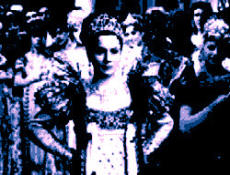Film Review
The true-life rags-to-riches story of Cathérine Hübscher, a
laundry maid who rose to the position of Duchess of Danzig under
Napoleon I, provided the subject for one of the most popular French
stageplays of the 19th century, Victorien Sardou and Émile
Moreau's
Madame Sans-Gêne.
First performed in Paris in 1893, the play proved to be such a hit that
it was adapted as an opera in 1915 and, in 1900, was one of the first
plays to be adapted for cinema, in a short silent film featuring
Gabrielle Réjane, the actress who first played Madame
Sans-Gêne on stage. Since, there have been around a dozen
screen adaptations of the play, the first sound version being directed
by Roger Richebé in 1941 and featuring that much-loved icon of
French cinema, Arletty.
Richebé's film is a respectable period piece, faithful to the
play and impressing both with its production design and the quality of
its lead performances. Arletty is an obvious shoe-in for the role
of Madame Sans-Gêne, a plain-speaking commoner who humorously
shows the po-faced imperial court to be a mockery of the revolutionary
ideals that brought Napoleon to power. Wonderfully out of place
amidst the pomp and pomposity of court life, Arletty's portrayal is
witty and captivating, and it is a shame that her arresting performance
isn't matched by that of her co-stars.
Playing Napoloen on screen for the last time is Albert
Dieudonné, the actor who famously portrayed the great historical
personage in Abel Gance's 1927 masterpiece
Napoléon
and its subsequent
sound
remake. Dieudonné is clearly comfortable in the role
and bears an uncanny physical resemblance to the great man himself,
although what makes him the best of all screen Napoleons is the ease
with which he manages to humanise him, playing him not as a mythic
superman but as an ordinary man elevated to an extraordinary position
of power. Dieudonné's scenes with Arletty are by far the
most rivetting in the film, touchingly truthful as they reveal the
human side of both characters. Overall, the film lacks the
inspired touch and is hampered by screenwriter Jean Aurenche's dogged
reluctance to stray too far from the original stageplay. As a
result, the film often feels stilted and airless, lacking in both
dramatic intensity and atmosphere. Arletty's glittering star
presence brightens what might otherwise have been a very dull piece of
theatre.
© James Travers 2013
The above content is owned by frenchfilms.org and must not be copied.
Film Synopsis
In 1792, Cathérine Hübscher is employed as a modest laundry
maid in the rue Sainte-Anne in Paris. With the help of her
fiancé, Sergeant Lefebvre, she saves an Austrian nobleman, Count
Neipperg, from the militia. Nine years later, under the reign of
Napoleon I, Lefebvre has become the Duke of Danzig and Cathérine
his wife. Catherine's habit of speaking her mind causes offence
at court, leading Napoleon to insist that Lefebvre must divorce her and
marry someone of more refined manners. The Emperor has a change
of heart when Catherine visits him in person and reminds him of her
past loyalties to the Revolution. The Lefebvres then faces
disgrace when an enemy, Savary, implicates them in a scandal involving
Count Neipperg...
© James Travers
The above content is owned by frenchfilms.org and must not be copied.



